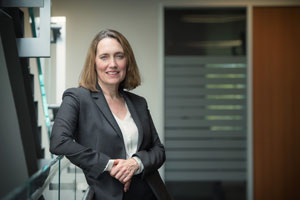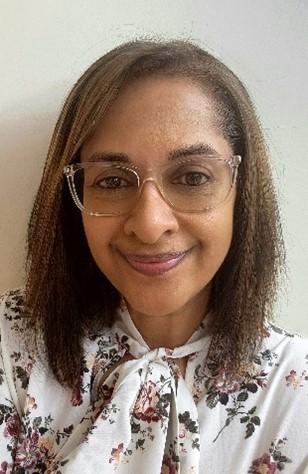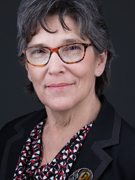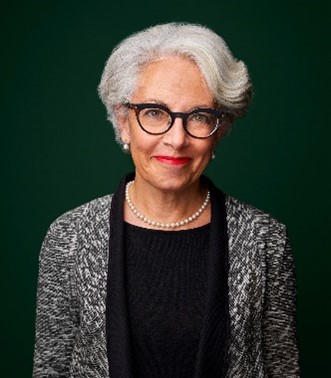Members of the Human Rights Expert Panel
The Human Rights Expert Panel is composed of the following members:
- Edward Béchard-Torres
- Catherine Dauvergne
- Shalini Konanur
- Lucie Lamarche
- Patricia Paradis
- Samantha Peters
- Brenda Young
Biographies
Edward Béchard-Torres

Edward Béchard-Torres is a law professor at the Lincoln Alexander School of Law, Toronto Metropolitan University. His research centers on comparative constitutional law, socio-economic rights, and their relationship to corporate and commercial law. He was previously a Scholar in Residence at New York University’s Center for Human Rights and Global Justice. He holds law degrees from McGill University and the University of Cambridge. From 2015-2016, he served as a law clerk to Justice Suzanne Côté at the Supreme Court of Canada. In addition to being a member of the Barreau du Québec, Professor Béchard-Torres has also practiced litigation at Davies Ward Phillips & Vineberg LLP and at IMK LLP in Montreal, appearing before various levels of court. In 2018, he assisted the amici curiae in the landmark Vavilov and Bell administrative law appeals before the Supreme Court. He is from Montreal and is Venezuelan-Canadian.
Catherine Dauvergne

Catherine Dauvergne has been working in refugee, immigration, and citizenship law over the past quarter of a century. She is a Professor of Law at the Peter A. Allard School of Law at the University of British Columbia and for a decade she held the Canada Research Chair in Immigration Law. In 2019, she was honoured with a Queen’s Counsel (now King’s Counsel) designation and in 2021, she was elected a fellow of the Royal Society of Canada. She has written three books that take a broad perspective on the theoretical underpinnings of the interrelated fields that comprise border law, including considering how human rights principles and discourses fit into a migration and citizenship framework. Dauvergne is also an editor or co-author of five other volumes, including Canada’s immigration and refugee law casebook. Much of Dauvergne’s work engages feminist critique of the law, and the place of women in immigration, refugee, and citizenship laws. From 2015-2020, Dauvergne served as the eighth dean of the Peter A. Allard School of Law.
Shalini Konanur

Shalini Konanur is the Executive Director and a lawyer at the South Asian Legal Clinic of Ontario (SALCO). Shalini went to Osgoode Hall Law School and was called to the Bar in Ontario in 2000. She has spent her entire legal career in Ontario’s Legal Aid Community Legal Clinic system working with low-income people in Ontario in rural and urban settings, with developed expertise in working with racialized communities. SALCO is also a founding and steering committee member of the Colour of Poverty – Colour of Change, which works to advance race equity and address the racialization of poverty. Shalini practices in a number of areas of law including human rights, immigration, violence against women, family, employment, income maintenance, tax, and tenant’s rights. In addition to direct legal casework, Shalini also engages in law reform work to advance systemic change on issues of systemic racism, and discrimination based on faith, immigration status, socio-economic status, and gender-identity. Shalini has appeared in test cases and appeals at all levels of court in Canada including the Ontario Human Rights Tribunal, Ontario Divisional Court, Ontario Court of Appeal, the Federal Court, the Federal Court of Appeal, and the Supreme Court of Canada. She is also recognized for her on-going work on the impact of violence in South Asian communities. She has also appeared at the United Nations to advise on Canada’s record on racism, discrimination, and violence. Shalini is a Bencher at the Law Society of Ontario, is appointed to the province’s Domestic Violence Death Review Panel and is a Governor at the Law Commission of Ontario. Shalini has been recognized for her work by the province of Ontario, the Canada Bar Association, the Ontario Bar Association, and the South Asian Bar Association of North America. She is committed to advancing access to justice, social justice, and equity for communities across Canada.
Lucie Lamarche

Lucie Lamarche (Barreau du Québec, 1978; Doctorate in International Law from the Université libre de Bruxelles, 1994) is a professor in the Department of Law at the Université du Québec à Montréal and an associate professor in the Faculty of Law at the University of Ottawa. She received the postdoctoral Jean Monnet Fellowship (1998), the Christine Tourigny Award of Merit for social justice from the Barreau du Québec (2002), the Centrale des syndicats du Québec Award of Merit (2006) and the Pierre Dansereau Award for a researcher’s social engagement (Association canadienne française pour l’avancement des savoirs (ACFAS) (2016)). She has been a fellow of the Royal Society of Canada since 2016. As the Gordon F. Henderson Chair from 2007 to 2013, she directed the Human Rights and Research and Education Centre at the University of Ottawa. Professor Lamarche also sits on the board of directors of Quebec’s Ligue des droits et libertés de la personne.
Patricia Paradis

Patricia Paradis has a career spanning more than four decades as a teacher, lawyer, mediator, and most recently, as the retired Executive Director of the Centre for Constitutional Studies (CCS) at the University of Alberta. In her role with the CCS, she managed research and public education on the Constitution, particularly the Charter of Rights and Freedoms. She taught Human Rights Law in the Faculty of Law for 23 years and served as the national board chair of the Women’s Legal Education and Action Fund, among many other boards on which she has served and continues to serve. Her work focuses primarily on equality rights issues. She is the recipient of several awards, including the Gerald L. Gall Human Rights Award, the Women in Law Leadership Award, the Queen’s Platinum Jubilee Medal, and an Alumnus Honour Award from the University of Alberta.
Samantha Peters

Samantha Peters (they/she) is a human rights lawyer with a background in labour and employment law. Samantha Peters engages in work at the intersection of law, education and policy, ranging from law reform initiatives to legal education to legislative research, including serving in the augural role of Black Legal Mentor-in-Residence/Mentor Juridique pour la Communauté Noire at the University of Ottawa Faculty of Law for the 2020 – 2021 academic year. Presently, Samantha is the Director of Legal Initiatives and Public Interest at Black Femme Legal which is a Black femme-led organization offering a toolkit in support of Black queer and trans women, femmes and gender expansive folks across the 2SLGBTQI+ community in Ontario experiencing intersecting forms of discrimination and/or harassment in their workplace. Samantha Peters also served as a member of the City of Toronto’s Lesbian, Gay, Bisexual, Transgender, Queer and Two-Spirit (LGBTQ2S+) Council Advisory Body where she provided advice to City staff and City Council on identified priority issues to support the elimination of barriers and inequities experienced by 2SLGBTQ+ communities in accessing City of Toronto programs and services. Samantha holds an Honours Bachelor of Arts from the University of Toronto, a Master of Arts from the Ontario Institute for Studies in Education at the University of Toronto, and a Juris Doctor from the University of Ottawa Faculty of Law with specializations in Public Law, and Dispute Resolution & Professionalism. She is also a LLM candidate at Queen's University Faculty of Law, specializing in Political and Legal Thought.
Brenda Young
Brenda Young is a proud Anishinaabe-Kwe who cherishes her privilege of being a mom. Through the years, her passion to address inequities resulted in public service to boards and committees committed to race relations, anti-bullying, mental health, and women’s issues. She continues to serve on the Legal Aid Ontario Aboriginal Issues Advisory Committee, the Law Society of Ontario Equity Advisory Group, and is a part-time member with the Human Rights Tribunal of Ontario.
As a lawyer, Ms. Young has devoted her career to understanding human rights and seeking solutions that respect human rights. She has examined human rights systems within the provincial, national, and international fora. She participated as an Indigenous Fellow with the United Nations Office of the High Commissioner for Human Rights and was also a recipient of the Law Foundation of Ontario Community Leadership in Justice Fellowship.